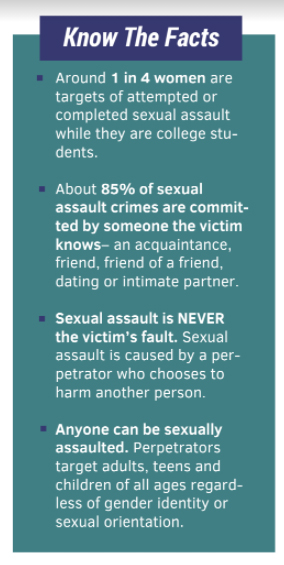|
24/7 HelpLine: 734-995-5444 If you are in immediate danger, call 911. |
Linea de Apoyo de 24 horas: 734-995-5444 Si esta en grave peligro, llame a 911. |
|
24/7 HelpLine: 734-995-5444 If you are in immediate danger, call 911. |
Linea de Apoyo de 24 horas: 734-995-5444 Si esta en grave peligro, llame a 911. |

Heading back to school is an exciting time for the more than 17 million college students in the U.S., but new environments and new experiences present additional risks and potentially dangerous situations. In fact, college-aged students are at the highest risk of being sexually assaulted—often by someone they know.
The first steps in staying safe are recognizing the risks and being proactive. You can take an active role in increasing your safety or the safety of those you care about.
What is Sexual Assault? 
Sexual assault includes attacks such as rape or attempted rape, as well as any unwanted sexual contact or threats. Usually, a sexual assault occurs when someone touches any part of another person’s body in a sexual way, even through clothes, without that person’s consent.
While there’s no way to eliminate the chance that something may happen, there are strategies that may reduce your risk or give you the confidence to step in to prevent a sexual assault. It’s important to remember that if you are sexually assaulted on campus it is not your fault – help and support are available.
Trust your gut & be true to yourself. If something doesn’t feel right, it probably isn’t. If you feel uncomfortable in a situation, trust your instincts and leave. If someone is pressuring you, it’s better to lie and make up an excuse to leave than to stay and be uncomfortable, scared, or worse. Your safety comes before someone else’s feelings or what they may think of you.
Take control of your online life. Be careful online. Think twice before you share personal information. Constantly posting social media updates on your whereabouts, activities, or class schedules may allow someone to track your every move. Use your best judgment when “checking in” on Facebook or Four-square and geo-tagging images you post to Instagram. Remember this motto: If you would not share the information with a stranger, then you shouldn’t share it online.
Make plans & be prepared. When going out, know ahead of time who is going and plan to stay together as a group. Construct a backup plan for the day/night so that all of your friends know where to meet up if someone gets separated and/or their phone dies. Don’t leave someone stranded in an unfamiliar, unsafe situation. Be sure to check that you have everything you need before you leave—a fully charged phone, the number for a reliable cab company, enough cash to get you home, the address to your dorm or college memorized, etc. Keep your phone on you at all times in case you find yourself in an uncomfortable or dangerous situation.
Party smart. Guard your drink at parties. Don’t accept one from people you don’t trust or know well. Stick to drinks you got or prepared yourself. If you go to the bathroom or step outside, take the drink with you or toss it out. It’s not always possible to know if something has been added to someone’s drink. In drug-facilitated sexual assault, a perpetrator could use a substance that has no color, taste, or odor. Keep track of what you’ve consumed so that you can stay in control. If you can’t remember how many drinks you’ve had, that means you’ve had too many. If you feel like you’re getting sick or are too intoxicated, ask a friend to help you get to a safe place or to a hospital.
Be a good friend. Watch out for each other. Stick together in groups, especially when traveling from one place to the next. If a friend is acting in a way that seems out of character, take notice. If he or she is overly intoxicated or seems to need assistance, get them to a safe place and support them. If you suspect that a friend has been drugged or needs medical attention because of over-intoxication or for any other reason, call a resident assistant, campus police, or 911.
SafeHouse Center provides many resources for survivors of sexual assault.
Questions or need to talk to an advocate? (734) 995-5444